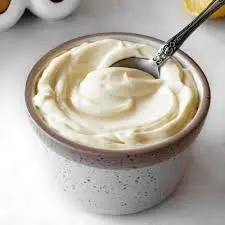Can Dogs Eat Mayonnaise? A Comprehensive Guide Every Pet Owner Should Know
As dog owners, can a dog eat mayonnaise? In this article, we’ll explore the safety of mayonnaise for dogs, the potential risks associated with its consumption, and healthy alternatives you can offer to keep your canine companion happy and healthy.

What Is Mayonnaise?
Mayonnaise is a creamy condiment made from a blend of ingredients, including oil, egg yolks, vinegar or lemon juice, and various seasonings. It’s commonly used in sandwiches, salads, and dips. While mayonnaise enhances the flavor of our meals, it raises important questions about its suitability for dogs.
Ingredients Breakdown
To determine whether mayonnaise is safe for dogs, let’s take a closer look at its main ingredients:
- Oil: Most mayonnaise recipes use vegetable oil, which is high in fat. While dogs need some fat in their diet for energy and healthy skin, excessive fat can lead to obesity and pancreatitis.
- Egg Yolks: Egg yolks provide protein and essential nutrients. Cooked eggs can be beneficial for dogs in moderation. However, raw eggs pose a risk of salmonella, which can affect both dogs and humans.
- Vinegar or Lemon Juice: These ingredients add flavor and acidity. In small amounts, both vinegar and lemon juice are generally safe for dogs. However, high acidity can cause digestive upset in sensitive dogs.
- Seasonings: Many store-bought mayonnaise brands contain seasonings, including salt, sugar, and potentially harmful ingredients like garlic or onion powder. High salt content can be dangerous for dogs, and garlic and onion are toxic.
Is Mayonnaise Safe for Dogs?
The short answer is that while mayonnaise is not inherently toxic to dogs, it is not an ideal food for them. Here’s why you should think twice before offering mayonnaise to your dog:
1. High Fat Content
Mayonnaise is rich in fat, which can lead to weight gain and health problems if consumed in large amounts. While some fat is necessary for your dog’s diet, it should come from healthier sources.
2. Potential Allergens
Some dogs may have allergies or sensitivities to ingredients found in mayonnaise, such as eggs or specific oils. If your dog tries mayonnaise for the first time, observe them closely for any signs of an allergic reaction, such as itching, swelling, or gastrointestinal distress.
3. Digestive Upset
The rich and fatty nature of mayonnaise can upset your dog’s stomach, leading to symptoms like vomiting or diarrhea. This is particularly true for dogs with sensitive digestive systems.
4. Toxic Ingredients
Certain commercial mayonnaise brands may contain garlic or onion powder, both of which are toxic to dogs. Even small amounts can lead to serious health issues, including gastrointestinal problems and damage to red blood cells.
What Should You Do If Your Dog Eats Mayonnaise?
If your dog accidentally consumes a small amount of mayonnaise, don’t panic. While it’s not the healthiest choice, a tiny taste is unlikely to cause immediate harm. However, you should monitor your dog for any signs of distress, including:
- Vomiting
- Diarrhea
- Lethargy
- Loss of appetite
- Abdominal discomfort
If you notice any concerning symptoms or if your dog has eaten a significant amount of mayonnaise, it’s best to consult your veterinarian for advice.
Healthier Alternatives to Mayonnaise for Dogs
If you’re looking to enhance your dog’s meals or provide a tasty treat without the risks associated with mayonnaise, consider these healthier alternatives:
1. Plain Yogurt
Unsweetened, plain yogurt is a fantastic substitute for mayonnaise. It contains beneficial probiotics that support your dog’s digestive health. Be sure to choose a yogurt without added sugars or flavors.
2. Mashed Sweet Potatoes
Cooked and mashed sweet potatoes are nutritious, flavorful, and can add creaminess to your dog’s food. They are rich in vitamins and fiber, making them a healthy addition to your dog’s diet.
3. Pumpkin Puree
Canned pumpkin (not the spiced pie filling) is high in fiber and beneficial for digestion. Many dogs enjoy the taste, and it can help regulate their bowel movements.
4. Peanut Butter
Most dogs adore peanut butter! Choose a natural variety that is free from added sugars and xylitol, which is toxic to dogs. Peanut butter can serve as a delightful treat or be used in homemade dog biscuits.
5. Low-Sodium Broth
Low-sodium chicken or beef broth can add flavor to your dog’s meals without harmful ingredients. Ensure that it does not contain onions or garlic.
Conclusion: Can a Dog Eat Mayonnaise?
In conclusion, while a small amount of mayonnaise is not toxic to dogs, it is not recommended due to its high-fat content and potential for digestive upset. The risks associated with certain ingredients, like garlic and onion, further emphasize the need for caution.
Instead of mayonnaise, consider healthier alternatives that provide nutritional benefits without the risks. Always consult your veterinarian if you have questions about your dog’s diet or are unsure about introducing new foods.
By prioritizing your dog’s health and well-being, you can ensure they live a long, happy life, free from the potential dangers of unsuitable foods like mayonnaise.
